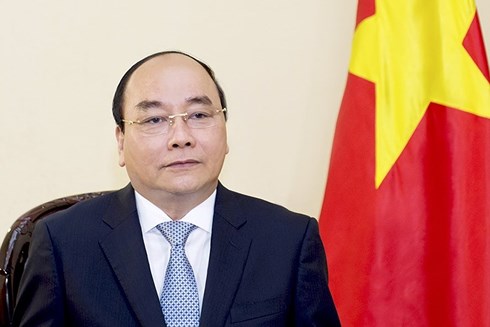Reporter: Dear Mr. Prime Minister, it is informed that Canadian Prime Minister Justin Trudeau made an invitation to you to the G7 Summit in June, 2018. One of the main subjects of the conference was climate change, ocean and clean energy. International investors currently assess Vietnam as one of the countries with great potential for developing renewable energy. Could you please tell us how Vietnam can promote and facilitate the development and investment in the fields of clean energy and renewable energy? One example is taken that Vietnam has very a large rare earth reserve. Can these sources be used to produce batteries for solar power generation in Vietnam? And how does Vietnam plan to mine and extract this rare earth reserve?

Prime Minister Nguyen Xuan Phuc affirmed that Vietnam has many conditions to develop renewable energy
Prime Minister Nguyen Xuan Phuc: Vietnam has great potential for the development of renewable energy and clean energy. It is estimated that the potential wind power capacity of Vietnam is likely to reach about 500-1,000 kWh/m2 per year and the average number of sunshine hours in the year ranges from 2,500 to 3,000 hours at average temperature of over 21°C.
According to the report by the German International Development Cooperation (GIZ) in June 2017, Viet Nam's technical potential of wind power is about 215,000MW, with about 340,000MW of solar power. Besides the wind and the sun energy, Vietnam is a large-scale agricultural producer, so it has abundant raw material sources for developing bio-energy. With these tremendous potentials, Vietnam is well positioned to develop renewable energy, gradually reducing the use of fossil fuels.
Some specific targets of the Renewable Energy Development Strategy include: Reducing greenhouse gas emissions as declared for commitment at COP21 Paris at about 5% by 2020 and with international assistance of resources, at about 25% by 2030; reducing the use of about 40 million tons of coal and 3,7 million tons of oil products by 2030; increasing the power output produced from renewable energy from about 58 billion kWh in 2015 to about 101 billion kWh by 2020, about 186 billion kWh by 2030; Increasing the proportion of households with solar-powered devices from about 4.3% in 2015 to around 12% by 2020, about 26% by 2030; Increasing biofuel production to meet about 13% of the transportation fuel demand by 2030.
To achieve these above targets, the Vietmese Government is implementing a large number of favourable mechanisms, policies on land, taxes, price, guarantee and public-private partnership (PPP) to promote domestic and oversea investment for renewable energy development in Viet Nam, including mechanisms to encourage the development of solar power projects. According to the Government’s Decision, the solar power projects: are exempted from import tax on some kinds of imported goods in order to create fixed assets for the projects; considered for the exemption or reduction of land use levy, rentals of land and water surface; electricity price is to be adjusted in line with the exchange rate of VND/USD, etc. Currently, the Government is considering adjusting the tariff of wind power to encourage investment in the coming period.
In addition to renewable energy, Vietnam is favoured by nature with a lot of mineral resources, including rare earth. Vietnam is one of the countries possessing a large reserve of rare earth with more than 20 million tons of the total estimated reserve. Vietnam wishes to co-operate in the research, development and transfer of high technologies in the mining and deep processing of rare earth ores to create products with high added value, ecofriendliness in the spirit of the environment and economic growth without bartering the environment.
Reporter: On the topic of clean energy, can the strategic investment for renewable energy development help Vietnam meet the increasing demand for energy to serve the development and implementation of clean energy development projects? Does Vietnam expect to attract investment from the G7 countries in the fields of renewable energy and energy in general? And if so, how will Vietnam plan?
Prime Minister Nguyen Xuan Phuc: Vietnamese Government has been applying a large number of mechanisms and policies to attract domestic and foreign investors to invest and trade in renewable energy on the basis of harmonizing the interests among the State, the investors and the community.
Vietnam has good co-operation relations with many countries, including G7 ones, in developing renewable energy. In fact, many G7 countries are implementing important projects on renewable energy development in Vietnam. For example: Mui Dinh wind power plant with a total capacity of 37.6MW, an investment of VND 1,272 billion by the German company EAB with; Tuy Phong wind power plant (30MW) with German technology, Phu Lac wind power plant (24MW) with capital and technology of Germany and Denmark.
Vietnam is willing to co-operate and facilitate all partners and believes that with financial potential, technology and experience in renewable energy development, investors of G7 countries will have more opportunities to become strategic investors in the field of renewable energy in Vietnam.
Evn.com.vn
Share